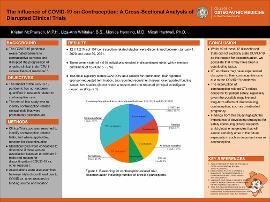| dc.contributor.author | McPherson, Kristen | |
| dc.contributor.author | Whitaker, Liza-Ann | |
| dc.contributor.author | Sajjadi, Nicholas | |
| dc.contributor.author | Price, Jemeca | |
| dc.contributor.author | Hartwell, Micah | |
| dc.date.accessioned | 2023-09-12T16:45:03Z | |
| dc.date.available | 2023-09-12T16:45:03Z | |
| dc.date.issued | 2022-02-18 | |
| dc.identifier | ouhd_McPherson_influenceofCOVID-19oncontraception_2022 | |
| dc.identifier.citation | McPherson, K., Whitaker, L., Sajjadi, N., Price, J., & Hartwell, M. (2022, February 18). Influence of COVID-19 on contraception: A cross-sectional analysis of disrupted clinical trials. Poster presented at Research Days at Oklahoma State University Center for Health Sciences, Tulsa, Ok. | |
| dc.identifier.uri | https://hdl.handle.net/11244/339535 | |
| dc.description.abstract | Background: The COVID-19 pandemic exacerbated barriers to contraceptive services and disrupted the progression of ongoing clinical trials (CTs) in several fields of medicine1–4, including contraceptive care. Further, sponsors have restricted CTs due to funding uncertainty. The impact of the pandemic has not yet been quantified in research related to contraception-related trials, thus our aim was to identify trials that were prematurely discontinued. | |
| dc.description.abstract | Methods: We searched ClinicalTrials.gov to identify contraception-related trials, and where applicable, reasons for discontinuation. We extracted the number of participants per trial, funding source, and trial location. We assessed associations between reasons for discontinuation (COVID-19 vs. other reasons) and 1) trial size via Mann-Whitney U test, funding source, and location via Fishers exact. | |
| dc.description.abstract | Results: Of the 107 contraceptive-related studies, 12 (11.21%) were discontinued between January 1, 2020, and June 30, 2021. There were a total of 4,614 individuals enrolled in discontinued trials, with a median enrollment of 18 (IQR: 5 - 276). Two trials explicitly stated COVID-19 as a reason for termination, four reported sponsor-requested termination, two reported recruitment issues, one reported funding issues, two studies did not report a reason and one principal investigator left. | |
| dc.description.abstract | Conclusions: For the 415 women enrolled in contraception-related CTs that were discontinued explicitly due to COVID-19, access to contraception may have been impaired or discontinued. Given that COVID-19 could be an underlying reason or contributing factor to why the remaining studies were terminated, it is also possible that more women’s contraceptive care was disrupted due to the effects of the pandemic. This is worrisome because discontinuation of contraception can have many negative effects, the most significant of which is unintended pregnancy and its resulting possible ramifications. | |
| dc.format | application/pdf | |
| dc.language | en_US | |
| dc.publisher | Oklahoma State University Center for Health Sciences | |
| dc.rights | The author(s) retain the copyright or have the right to deposit the item giving the Oklahoma State University Library a limited, non-exclusive right to share this material in its institutional repository. Contact Digital Resources and Discovery Services at lib-dls@okstate.edu or 405-744-9161 for the permission policy on the use, reproduction or distribution of this material. | |
| dc.title | Influence of COVID-19 on contraception: a cross-sectional analysis of disrupted clinical trials | |
| osu.filename | ouhd_McPherson_influenceofCOVID-19oncontraception_2022.pdf | |
| dc.type.genre | Presentation | |
| dc.type.material | Text | |
| dc.subject.keywords | contraception | |
| dc.subject.keywords | COVID-19 | |
| dc.subject.keywords | clinical trials | |
